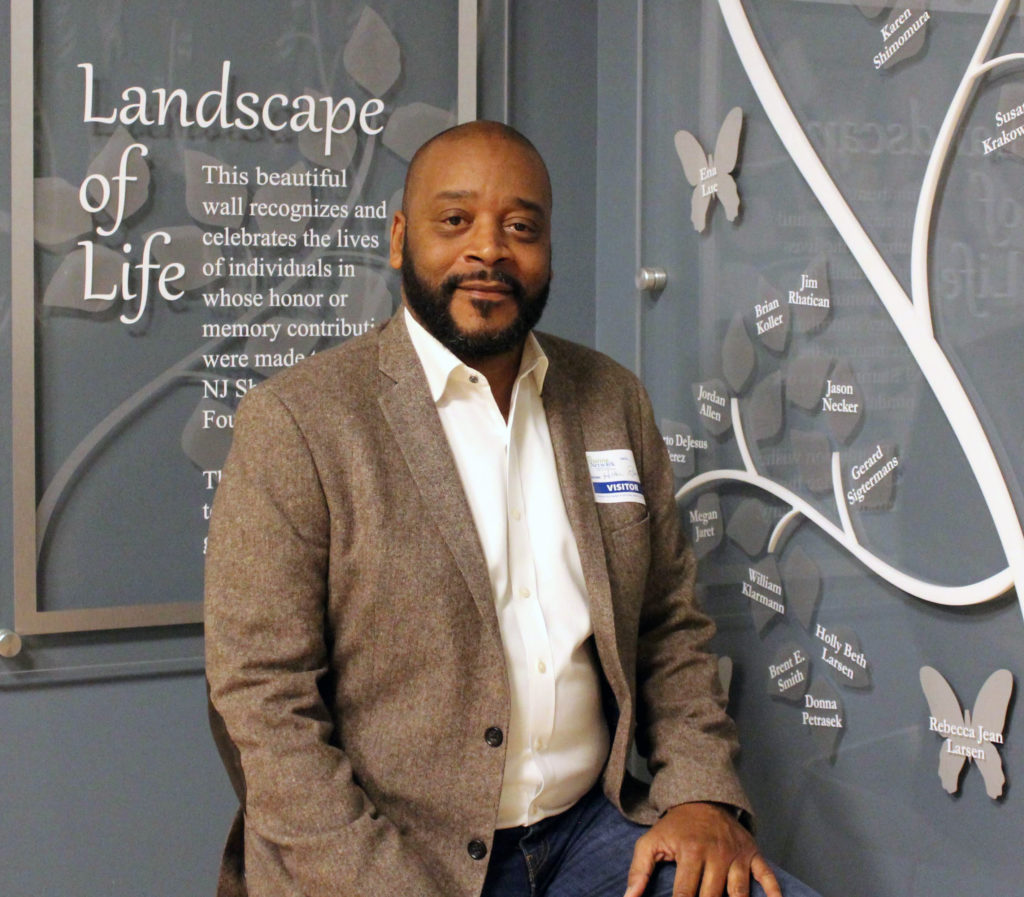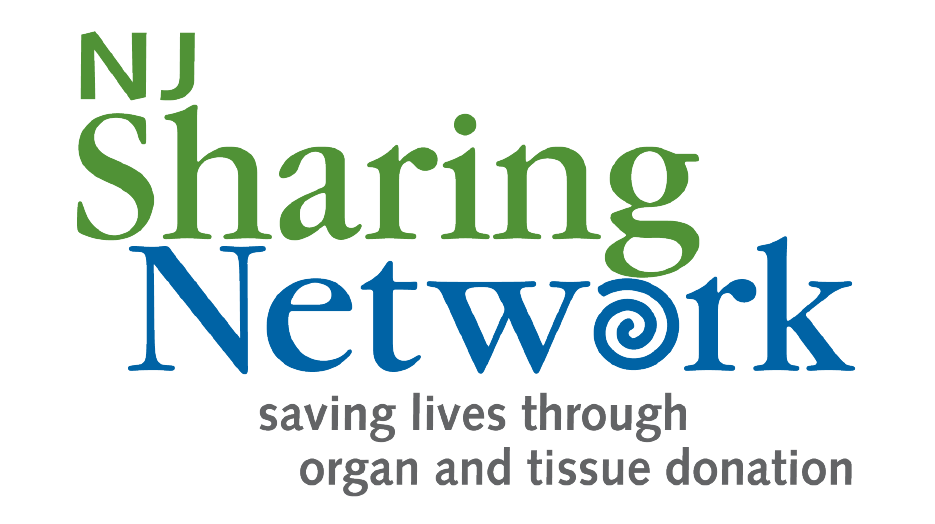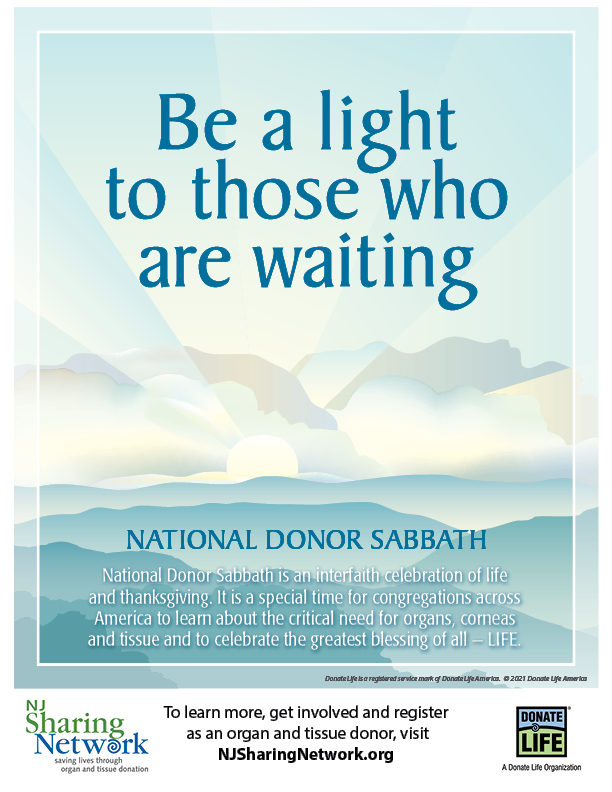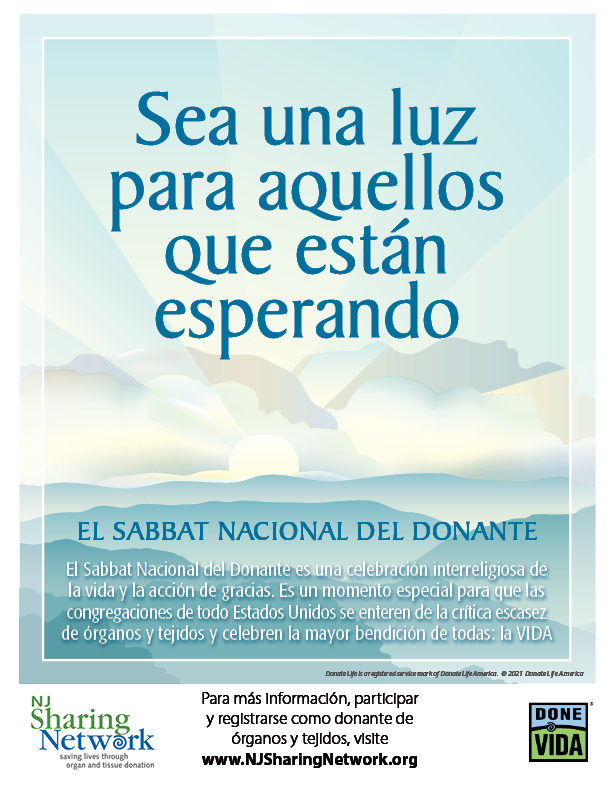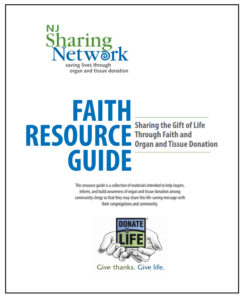National Donor Sabbath
Observed annually in November, National Donor Sabbath seeks to educate faith-based communities across the country about the critical need for organ and tissue donation, and the vital role their faith plays in making the decision to register as a donor.
Most religions support donation and view this gift as the ultimate act of charity and love. Leaders from churches, synagogues, mosques and other houses of worship are encouraged to share information with their members and bring much-needed attention to this important cause.
For more information about National Donor Sabbath and ways to get involved, please contact E. Denise Peoples at dpeoples@njsharingnetwork.org.

"The greatest love you can give to anyone is to give the gift of life."
Reverend Dr. Vanessa M. Brown
Rivers of Living Water
Newark, NJ
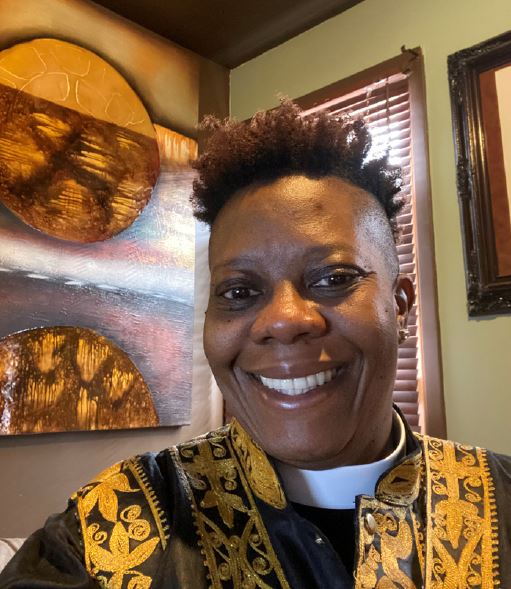
What Does Your Religion Say About Donation?
AME & AME Zion
Donation is viewed as an act of neighborly love and charity by these denominations. They encourage all members to support donation as a way of helping others.
Amish
Approved if there is a definite indication that the health of the recipient would improve, but reluctant if the outcome is questionable.
Assembly of God
Donation is highly supported.
Bahai
The Bahai faith believes that transplants are acceptable if prescribed by medical authorities, and believers are permitted to donate their bodies for research and for restorative purposes.
Baptist
Baptist groups have supported organ and tissue donation as an act of charity and leave the decision to donate up to the individual.
Buddhism
Buddhists believe organ and tissue donation is a matter that should be left to an individual's conscience.
Christian Scientist
The question of donation is left to the individual church member.
Episcopal
In 1982, a resolution was passed that recognizes the life-giving benefits of blood, organ and tissue donation. All Episcopalians are encouraged to become donors.
Evangelical Lutheran Church of America
There is no church law or theological reason preventing Lutheran Christians from choosing to be organ donors, and God’s promise to resurrect the dead is not compromised by organ donation.
Greek Orthodox
Donation is supported as a way to better human life through transplantation or research.
Hinduism
While there are no references to organ and tissue donation in Hindu scriptures, Hindu beliefs and principles support organ and tissue donation. Additionally, the Hindu philosophy of karma and helping others supports the notion of organ donation.
Independent Conservative Evangelical
In general, Evangelicals have no opposition to donation. Each church is autonomous and leaves the decision to donate up to the individual.
Islam
The Holy Qur’an, chapter 5:32, says, “Whosoever saves the life of one person it would be as if he saved the life of all mankind.” Normally, violating the human body, whether living or dead, is forbidden in Islam – but the Sharia (Muslim law) believes this can be overruled when saving another person’s life.
Jehovah’s Witness
Donation is a matter of individual decision. Jehovah's Witnesses do allow for transplantation after blood has been drained from the organ. Worldwide, there are more than 90,000 doctors who have made it known that they are willing to treat Jehovah’s Witnesses without blood.
Janism
In Jainism, compassion and charity are considered to be major virtues. Organ donation has been widely supported by the Jain community leaders and monks.
Judaism
All four branches of Judaism support and encourage donation.
Mennonite
Mennonites believe the decision to donate is up to the individual and/or their family.
Mormon
In 2007, the Church of Latter Day Saints issued a statement on donation, which read in part: “The donation of organs and tissue is a selfless act that often results in great benefit to individuals with medical conditions.”
Pentecostal
Pentecostals believe that the decision to donate should be left up to the individual.
Quakers
Organ and tissue donation is believed to be an individual decision.
Presbyterian
Presbyterians encourage and support donation.
Roman Catholic Church
Donation is viewed as an act of charity and love. Transplants are morally and ethically acceptable to the Vatican.
Seventh Day Adventist
Donation and transplantation are strongly encouraged.
Sikh
The Sikh religion stresses the importance of performing noble deeds, and saving a life is considered one of the greatest forms of noble deeds. Therefore organ donation is deemed acceptable to the Sikh religion.
Unitarian Universalist
Donation is widely supported and viewed as an act of love and giving.
United Methodist
A 1984 policy statement notes that the church “recognizes the life-giving benefits of organ and tissue donation, and thereby encourages all Christians to become organ and tissue donors.”
Ways to Celebrate National Donor Sabbath
Start the Conversation - Encourage your faith leaders and members of your congregation to talk with their families about registering as an organ donor.
Educate - Collaborate with your Faith Based Leader to request a speaker from NJ Sharing Network to present at your special event or service, and include information in your bulletin, newsletter and on your house of worship's website.
Host a Donor Registration Drive - Set up a table display at your house of worship before and after services to distribute educational materials and answer questions about organ and tissue donation.
Get Social - Share our life-saving mission on Facebook, Instagram and Twitter, and ask congregants to follow us. Check out the graphics below to include in your posts.
To request a speaker or additional materials, please contact E. Denise Peoples at dpeoples@njsharingnetwork.org or call 973-665-4687.
Share our Faith-Based Education Videos
Rabbi Simon of Chabad of Bergen County in Teaneck has spent his life trying to inspire others to live better lives, and his own selfless actions have served as a shining example to others. He is one of only a handful of living donors to have ever donated both a kidney and a part of his liver to save the lives of two others.
“As a rabbi, I do a lot of talking about love, doing things for others and altruism,” said Rabbi Simon. “It’s something we all speak about, but how often do we have the opportunity to really set ourselves aside for another? This was my opportunity to do that, and I didn’t want to let it go.”
A Matter of Faith
Thank you to Gift of Life Michigan for sharing this video.
Social Media Graphics
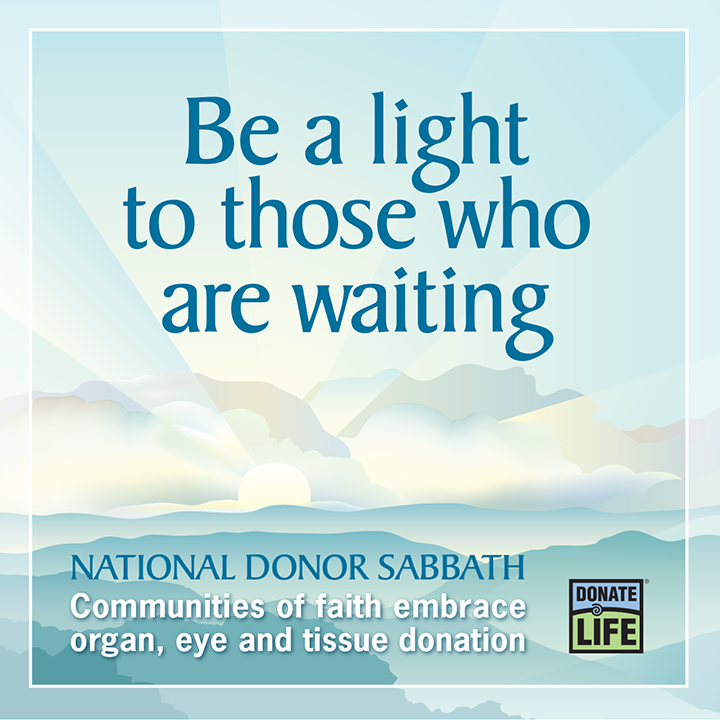
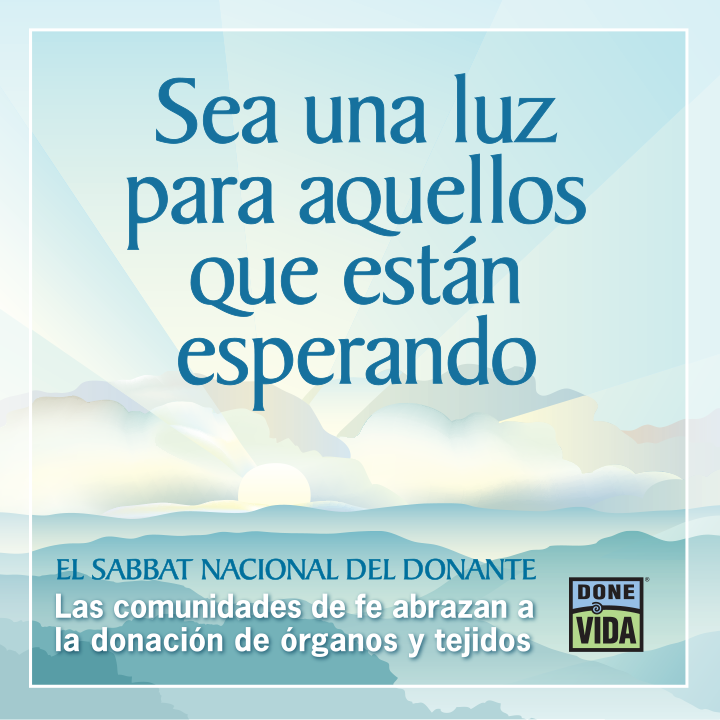
Register as an Organ and Tissue Donor
One donor can save 8 lives and restore health to over 75 others. Registering online takes less than one minute!
2. iPhone Feature! Join the National Donate Life Registry using the Health app.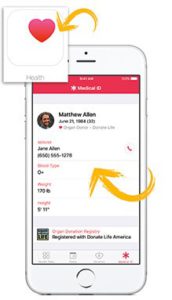
"One of the basic tenets of faith is giving and receiving. Whether you are a person of faith or not, love is something with which we all identify. What happens within the walls of NJ Sharing Network can be recognized as love."
... but the greatest of these is LOVE. — 1 Corinthians 13:13
Pastor Hilton Rawls, Jr.
Greater Grace Church
East Orange, NJ
Kidney Recipient
